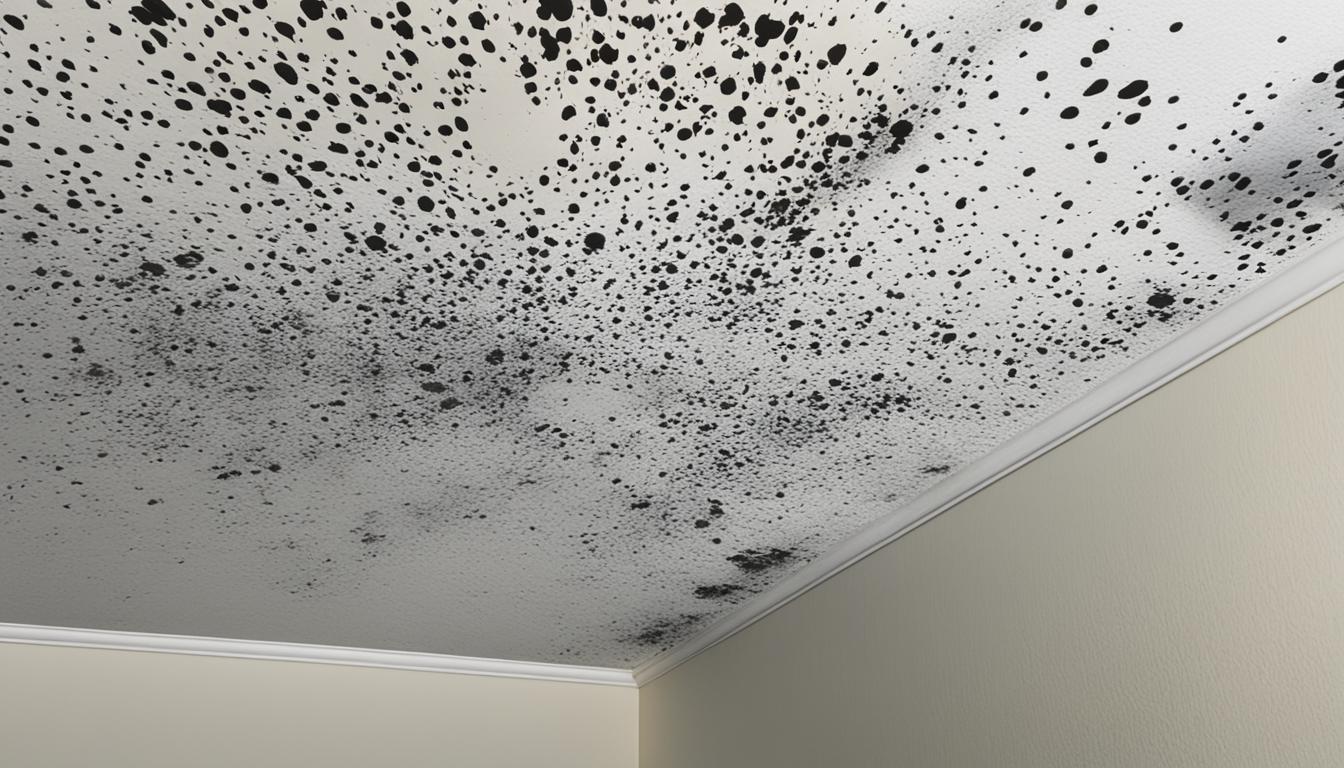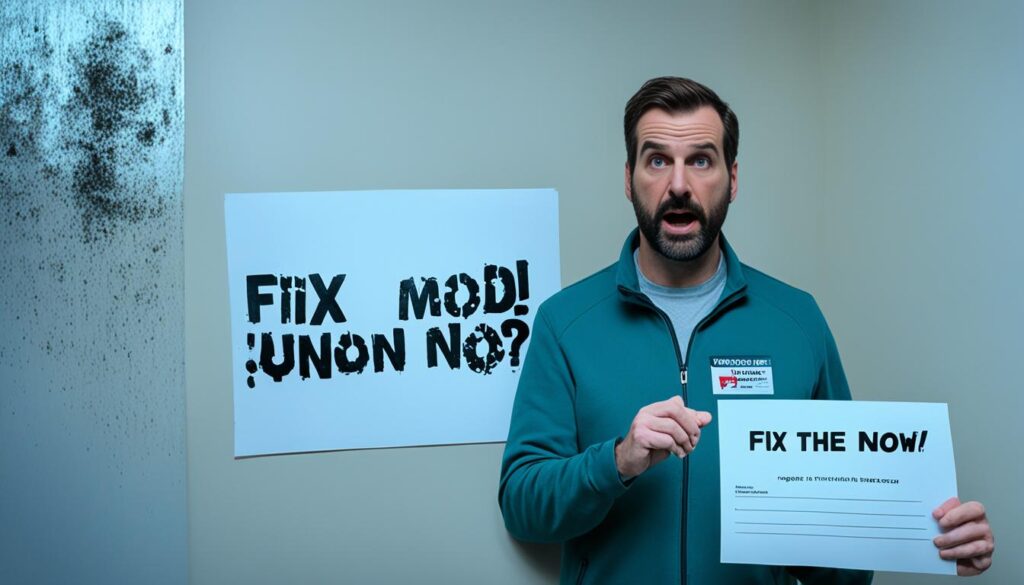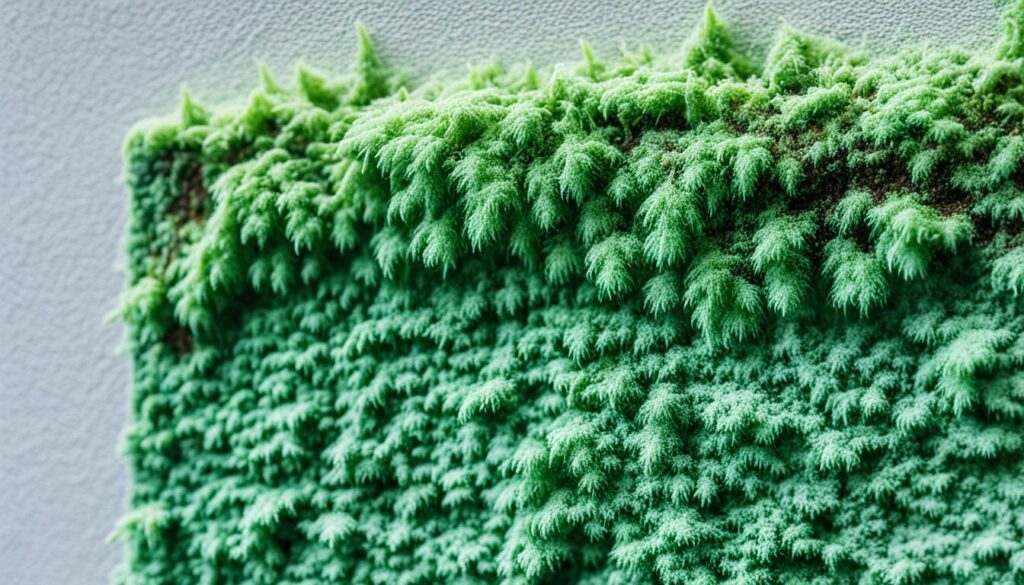
Landlord Issues? Steps for Unfixed Mold Damage
If you’re a tenant living in an apartment and facing mold damage that your landlord has ignored, it’s crucial to know your rights and take action. Mold damage can pose health risks and damage your property, and as a tenant, you have legal rights and protections to ensure a safe and habitable living environment.
In this article, we will guide you through the steps you can take when your landlord fails to address mold damage in your apartment. From understanding the impact of mold on your health and property to asserting your tenant rights, we’ll provide you with the knowledge you need to navigate this challenging situation.
Whether it’s repairs, maintenance, or legal recourse, we’ll empower you with actionable steps to protect your rights and resolve the mold damage issue effectively. It’s time to take control and ensure that your living conditions meet the required standards.
Key Takeaways:
- Mold damage in apartments can pose health risks and lead to property damage if left unfixed.
- Tenants have legal rights and responsibilities, including documenting and reporting mold damage to landlords.
- If your landlord ignores mold damage, you can take steps such as sending a written request, contacting local housing authorities, and seeking legal assistance.
- Hiring professional mold assessors and remediation services can effectively address the mold issue in your apartment.
- Legal recourse, including filing a lawsuit or seeking compensation, may be available if your landlord refuses to fix the mold damage.
Understanding Mold Damage in Apartments
Mold can be a serious issue in apartments and can cause significant damage if left unaddressed. It is important for tenants and landlords to understand what mold is and the potential risks it poses. Mold is a type of fungus that thrives in moist environments, and apartments with water leaks or high humidity levels are particularly susceptible to mold growth.
Mold damage in apartments can lead to:
- Structural deterioration
- Unsightly stains
- Unpleasant odors
Mold not only damages the physical structure of the apartment but also poses health risks to occupants. Exposure to mold can cause respiratory issues, allergies, and other health complications, especially for individuals with weakened immune systems or pre-existing respiratory conditions.
Addressing mold damage promptly is crucial to:
- Protect the well-being of tenants
- Prevent further damage to the apartment
- Maintain a safe and habitable living environment
Landlords have a legal responsibility to maintain their rental properties and ensure that any mold damage is promptly repaired. This includes addressing underlying causes such as leaks, improving ventilation, and conducting regular maintenance to prevent mold growth.
The Importance of Prompt Action
When mold damage is detected in an apartment, it is crucial for both tenants and landlords to take immediate action. Delaying repairs can worsen the damage and increase the health risks associated with mold exposure. Tenants should promptly report the issue to their landlord in writing and document any communication or lack thereof.
“Mold is not only a cosmetic issue but also a serious health hazard. It is essential for landlords to address mold damage in apartments promptly to ensure the safety and well-being of their tenants.” – [Expert Name], Mold Remediation Specialist
By addressing mold damage in a timely manner, landlords can fulfill their obligation to provide habitable living conditions and avoid potential legal disputes with tenants. Taking proactive measures such as regular inspections, prompt repairs, and proper maintenance can help prevent mold issues in the long run.
Tenant Rights and Responsibilities
When it comes to dealing with mold damage in your apartment, understanding your rights and responsibilities as a tenant is crucial. By being informed and proactive, you can protect yourself and ensure that your landlord addresses the issue in a timely manner.
First and foremost, it is important to document the mold damage and communicate your concerns with your landlord in writing. This creates a paper trail that can be used later if necessary. Be specific about the extent of the damage and request repairs in accordance with your rental agreement.
Remember: You have the right to a safe and habitable living environment. Mold can cause health problems and property damage, so it is essential that your landlord takes appropriate action to address the issue.
Additionally, familiarize yourself with the tenant rights and legal protections in your local area. Different states and municipalities may have specific laws and regulations regarding mold damage and landlord obligations. Knowing your rights can help you navigate the situation effectively.
If your landlord fails to respond or address the mold damage, you may need to take further action. This can include contacting local housing authorities or seeking legal assistance. In some cases, you may be entitled to compensation for any property damage or health issues caused by the mold.
Protecting yourself and your rights is paramount in these situations. By understanding your rights, documenting the issue, and taking appropriate action, you can ensure that your landlord fulfills their obligations and that the mold damage is properly addressed and resolved.

| Tenant Rights and Responsibilities | |
|---|---|
| Tenant Rights | Tenant Responsibilities |
| 1. Right to a safe and habitable living environment | 1. Document mold damage and communicate concerns in writing |
| 2. Right to timely repairs and maintenance | 2. Familiarize yourself with local tenant rights and regulations |
| 3. Right to compensation for property damage or health issues caused by the mold | 3. Take appropriate action if landlord fails to address the issue |
Steps to Take When Your Landlord Ignores Mold Damage
When faced with a landlord who ignores mold damage in your apartment, it’s crucial to take prompt action to protect your health and rights. Follow these step-by-step guidelines to address the issue effectively:
- Conduct a thorough inspection: Start by identifying all areas affected by mold. Document the damage with clear photographs and detailed notes to support your case.
- Send a formal written request: Write a formal letter or email to your landlord, outlining the mold damage issue, the potential health risks it poses, and your expectations for repair and maintenance. Keep a copy of your communication as proof of notification.
- Consult local housing authorities: If your landlord fails to respond or address the problem, contact your local housing authority or building inspector for guidance and assistance. They can provide information about relevant regulations and help enforce necessary repairs.
- Seek legal assistance if necessary: If your landlord continues to ignore the mold damage after following the proper procedures, consult with a lawyer who specializes in landlord-tenant disputes. They can evaluate your case and guide you through the legal recourse options available to you.
- Maintain clear communication: Throughout the process, it’s important to maintain open and transparent communication with your landlord. Keep records of all correspondence, including dates, times, and details of conversations or meetings. This documentation can be valuable in case of legal proceedings.
Remember, addressing mold damage is not only crucial for your own well-being but also for maintaining a safe and habitable living environment. Take proactive steps to protect your health and assert your rights as a tenant.
Quote:
“Taking immediate action when your landlord ignores mold damage is essential to safeguard your health and rights. Follow the proper procedures, document all communication, and, if necessary, seek legal assistance to ensure your concerns are addressed.”
Hiring Professional Mold Assessors and Remediation Services
When dealing with mold damage in your apartment, it’s important to seek the expertise of professional mold assessors and remediation services. These professionals are equipped with the knowledge, tools, and experience to effectively identify and eliminate mold issues, ensuring the safety and well-being of your living space.
Professional mold assessors are trained to conduct thorough inspections, assessing the extent of the mold damage and identifying any underlying causes. They use specialized equipment, such as moisture meters and thermal imaging cameras, to detect hidden mold growth and moisture sources.
Once the mold assessment is complete, remediation services can be employed to remove the mold and restore the affected areas. These services involve the controlled containment of mold, using techniques such as negative air pressure and physical barriers, to prevent further contamination. The professionals will then safely remove and dispose of the mold-affected materials, followed by thorough cleaning and decontamination.
Hiring professional mold assessors and remediation services offers several benefits:
- Expertise: These professionals have extensive knowledge of mold types, their growth patterns, and the most effective methods for removal. They understand the potential health risks associated with mold and can provide appropriate recommendations.
- Efficiency: Professional mold assessors and remediators have the necessary tools and resources to handle mold damage effectively. They follow industry best practices, ensuring a thorough and efficient restoration process.
- Safety: Mold removal can be hazardous if not done correctly. These professionals have the proper protective gear and follow safety protocols to minimize risks to themselves and the occupants of the apartment.
To ensure you receive reliable and high-quality mold assessment and remediation services, it’s recommended to choose a trusted provider like Fix Mold Miami. They specialize in mold assessments, prevention, and remediation, offering comprehensive solutions to address mold damage in apartments.

Contact Fix Mold Miami today at 555-123-4567 or visit their website at www.fixmoldmiami.com to schedule a mold assessment and find out more about their services.
Legal Recourse and Seeking Compensation
When a landlord refuses to address mold damage in your apartment, knowing your legal rights and options can help you seek the compensation you deserve. Taking legal action may be necessary when other attempts to resolve the issue have failed.
Filing a Lawsuit:
If your landlord has breached the terms of your rental agreement by neglecting to fix mold damage, you may have grounds to file a lawsuit. Consult with an attorney experienced in landlord-tenant disputes to understand the process and likelihood of success.
Seeking Compensation:
If mold damage has caused property damage or health issues, you may be entitled to compensation. Document the extent of the damage, including photographs and written records of any related expenses or medical bills.
Consulting with an Attorney:
When pursuing legal recourse, it is crucial to seek advice from an attorney who specializes in landlord-tenant law. They can guide you on the best course of action and help protect your rights throughout the process.
Remember, always review your rental agreement to ensure you understand your landlord’s responsibilities and your legal rights as a tenant. Taking proactive steps to address mold damage can lead to a resolution in a timely manner.
If you need legal assistance or have any questions, reach out to our experienced team at LegalTech: www.legaltechlawyers.com
Disclaimer: The image above illustrates the concept of legal recourse and seeking compensation. It does not represent any specific legal situation.
Conclusion
Unfixed mold damage in apartments can pose serious health risks and property damage. When faced with this issue, it is crucial for tenants to take action and assert their rights. By following the steps outlined in this article, tenants can navigate the process of addressing mold damage effectively and hold their landlords accountable.
Tenant rights and responsibilities play a crucial role in dealing with mold damage. It is important for tenants to document the issue and communicate with their landlords in writing. Understanding the relevant laws and regulations can help tenants protect their legal rights and ensure that their landlords fulfill their responsibilities.
Seeking appropriate professional assistance is key in addressing mold damage. Hiring professional mold assessors and remediation services, such as Fix Mold Miami, can provide expertise and tools to effectively identify and eliminate mold issues in apartments. Additionally, in cases where landlords refuse to address the mold damage, tenants have legal recourse and can consult with attorneys specializing in landlord-tenant disputes to seek compensation or file a lawsuit for breach of contract.




